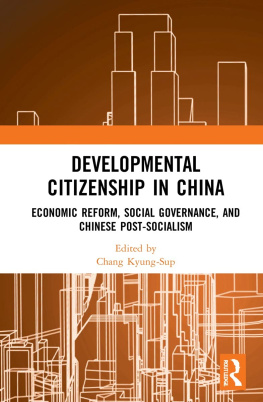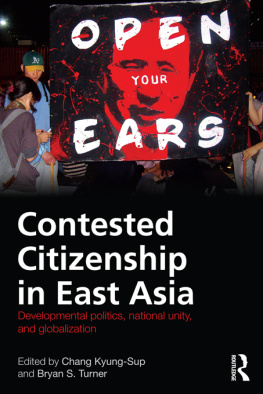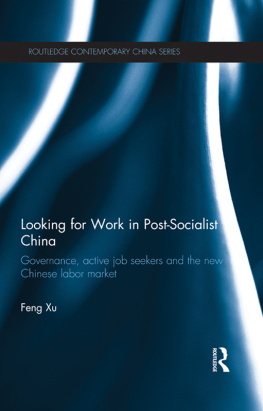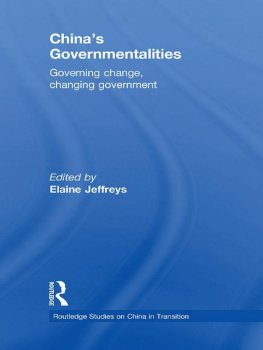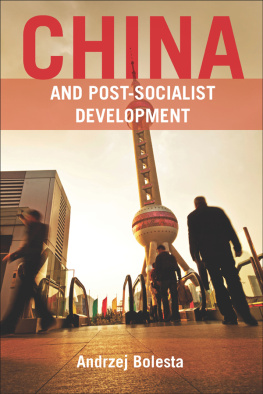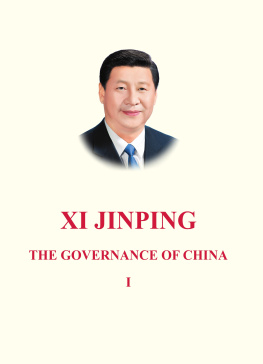Developmental Citizenship in China
This book offers the very first collaborative analysis of various conditions and aspects of developmental citizenship in China and its practical and ideological implications for Chinese post-socialism.
Development in post-socialist China much like development in Chinas industrialized capitalist neighbors is a collective political economic project which simultaneously involves political, social, as well as economic dimensions of public governance. In such a historical context, developmental citizenship is a generic category of citizenship in practice, not reducible to separate civil, political, or social rights. Improving peoples material livelihood through augmented jobs and incomes has become the raison detre of post-socialist dictatorial politics in China (and a host of other post-socialist nations). A careful and comprehensive observation of post-Mao China in citizenship perspective reveals the practical centrality of developmental citizenship in post-socialist social governance. If China is compared with its industrialized capitalist neighbors such as Japan, South Korea, and Taiwan as to their common sociopolitical order of national developmentalism, the pervasive scope and systemic varieties of developmental citizenship-in-practice are easily discovered.
The chapters in this book were originally published as a special issue of the journal Citizenship Studies.
Chang Kyung-Sup is Professor of Sociology at Seoul National University, Seoul, Korea. His work on Chinese development has been published in World Development, Journal of Development Studies, Economy and Society, Rationality and Society, etc. His books on Asian citizenship include: Contested Citizenship in East Asia: Developmental Politics, National Unity, and Globalization (coedited with Bryan S. Turner, 2012); Transformative Citizenship in South Korea: Politics of Transformative Contributory Rights (2021), and more.
First published 2022
by Routledge
2 Park Square, Milton Park, Abingdon, Oxon, OX14 4RN
and by Routledge
605 Third Avenue, New York, NY 10158
Routledge is an imprint of the Taylor & Francis Group, an informa business
2022 Taylor & Francis
All rights reserved. No part of this book may be reprinted or reproduced or utilised in any form or by any electronic, mechanical, or other means, now known or hereafter invented, including photocopying and recording, or in any information storage or retrieval system, without permission in writing from the publishers.
Trademark notice: Product or corporate names may be trademarks or registered trademarks, and are used only for identification and explanation without intent to infringe.
British Library Cataloguing-in-Publication Data
A catalogue record for this book is available from the British Library
ISBN13: 978-1-032-11397-5 (hbk)
ISBN13: 978-1-032-11398-2 (pbk)
ISBN13: 978-1-003-21973-6 (ebk)
DOI: 10.4324/9781003219736
Typeset in Minion Pro
by codeMantra
Publishers Note
The publisher accepts responsibility for any inconsistencies that may have arisen during the conversion of this book from journal articles to book chapters, namely the inclusion of journal terminology.
Disclaimer
Every effort has been made to contact copyright holders for their permission to reprint material in this book. The publishers would be grateful to hear from any copyright holder who is not here acknowledged and will undertake to rectify any errors or omissions in future editions of this book.
The chapters in this book were originally published in the journal Citizenship Studies, volume 24, issue 7 (2020). When citing this material, please use the original page numbering for each article, as follows:
- Why developmental citizenship, why China? An analytic introduction
- Chang Kyung-Sup
- Citizenship Studies, volume 24, issue 7 (2020) pp. 847855
Chapter 1
- Developmental pluralism and stratified developmental citizenship: an alternative perspective on Chinese post-socialism
- Chang Kyung-Sup
- Citizenship Studies, volume 24, issue 7 (2020) pp. 856870
Chapter 2
- The local state and nongmingong citizenship in Guangdong: local welfare as developmental contributory rights
- Yoon Jongseok
- Citizenship Studies, volume 24, issue 7 (2020) pp. 871886
Chapter 3
- Corporate social vs. developmental responsibility: corporate citizenship in the restructuring of Chinas pharmaceutical industry
- Woojong Moon
- Citizenship Studies, volume 24, issue 7 (2020) pp. 887903
Chapter 4
- Infrastructural developmental citizenship: Chinese lawyers and state-framed marketization
- Dongjin Lee
- Citizenship Studies, volume 24, issue 7 (2020) pp. 904917
Chapter 5
- Chinas ethnic minority and neoliberal developmental citizenship: Yanbian Koreans in perspective
- Park Woo, Robert Easthope and Chang Kyung-Sup
- Citizenship Studies, volume 24, issue 7 (2020) pp. 918933
Chapter 6
- The re-making of developmental citizenship in post-handover Hong Kong
- James K. Wong and Alvin Y. So
- Citizenship Studies, volume 24, issue 7 (2020) pp. 934949
Chapter 7
- Developmental citizenship, symbolic landscapes, and transformation in China and South Korea
- Erik Mobrand
- Citizenship Studies, volume 24, issue 7 (2020) pp. 950957
For any permission-related enquiries please visit:
http://www.tandfonline.com/page/help/permissions
Chang Kyung-Sup, Department of Sociology, Seoul National University, Seoul, Korea.
Robert Easthope, Department of Sociology, Seoul National University, Seoul, Korea.
Dongjin Lee,Department of Sociology, Kyungpook National University, Daegu, Korea.
Erik Mobrand, Graduate School of International Studies, Seoul National University, Seoul, Korea.
Woojong Moon, School of Nursing, Hanyang University, Seoul, Korea.
Park Woo, College of Liberal Arts, Hansung University, Seoul, Korea.
Alvin Y. So, Division of Social Science, Hong Kong University of Science and Technology, Hong Kong, China.
James K. Wong, Division of Social Science & Division of Public Policy, Hong Kong University of Science and Technology, Hong Kong, China.
Yoon Jongseok, Liberal Arts College, Gwangju Institute of Science and Technology, Gwangju, Korea.
Seoul National University financially supported the Institute for China Studies (ICS) for the international conference in October 2018, from which the 2020 special issue of Citizenship Studies was prepared. Special thanks are due to Professor Chung Un-Chan for his university leadership in helping establish the Institute and Professor Lee Hyeon-Jung for her effort for the international conference as its director. In organizing the international conference and editing the special issue and this book, I was supported by the National Research Foundation of Korea Grant (NRF-2014S1A5B1018229).

